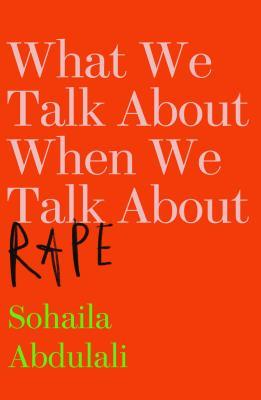What do you think?
Rate this book


265 pages, Paperback
First published October 25, 2018
Discussions about rape are so often irrational, and sometimes outright bizarre. It’s the only crime to which people respond by wanting to lock up the victims. It’s the only crime that is so bad that victims are supposed to be destroyed beyond repair by it, but simultaneously not so bad that the men who do it should be treated like other criminals.Although titled What We Talk About When We Talk About Rape this book is also about what we don’t talk about when we talk about rape, like how
it’s the weirdest things that can get you. Like dentophobia.When I was two thirds of the way through this book I’d already recommended it to a counsellor who works for my state’s rape crisis hotline and would recommend it to anyone who has experienced sexual assault, knows someone who has experienced sexual assault, works with people who have experienced sexual assault or want to read an intelligent, thoughtful book about this truly global issue. While there are stories of people from America in this book there are also those from all of those other places that aren’t America, like India, Australia, Africa, Europe and the Middle East. There’s also a wonderful cross section of peoples’ experiences, from the poorest and most marginalised to well known cases and celebrities.
you know you can get away with it because the whole system is set up to help you get away with it.My favourite lightbulb moment during my first read of this book (I expect it will be the first of many reads) came when I encountered an acronym that has validated my experience so much. Jennifer Freyd, writing about betrayal trauma theory in the nineties,
proposed that abusers frequently respond to accusations with “DARVO” - Deny, Attack, and Reverse Victim and Offender.This has helped me understand why a rapist overtly threatened me with legal action twice (so far) for reporting him and covertly attacked my credibility. While he had a serious amount of institutional consent behind him and is currently the owner of a Rape Free Card, this new knowledge has helped me in the best possible way … I know I’m not alone and there’s even an acronym to prove it.
If you talk about it, you’re a helpless victim angling for sympathy. If you’re not a helpless victim, then it wasn’t such a big deal, so why are you talking about it? If you’re surviving and living your life, why are you ruining some poor man’s life? Either it’s a big deal, so you’re ruined, or it’s not a big deal and you should be quiet.Thank you so much to NetGalley and The New Press for the opportunity to read this book. My current activism level is set to: Need to do something positive immediately!
Rape culture. The totality of all the big and little things we do, say and believe that ultimately lead to the conclusion that it's okay to rape. Perhaps not any one of the little things: serving your son first like a good Indian mother doesn't mean you condone rape; making fun of lady drivers doesn't mean you condone rape; saving for your daughter's dowry doesn't mean you condone rape; saying "boys will be boys" on the playground doesn't mean you condone rape. But each of these chips away at women's and girls' self-respect, and gives boys permission to feel a little more entitled, a little more important, a little more as though they have a free pass to maraud through the world and take without thinking.